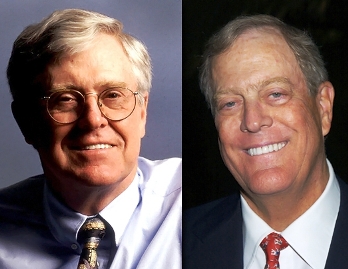With the conservative political activist Koch brothers in the news questions of political influence always come up: Do the rich call the shots? Has the United States become more of an oligarchy – a power structure that rests primarily with the elite few – than a democracy?

The New York Times Room for Debate (Apr. 21), explored those questions. “A recent study by Martin Gilens and Benjamin I. Page examining 30 years of opinion surveys and policy decisions by the federal government found that, ‘When a majority of citizens disagrees with economic elites and/or with organized interests, they generally lose.’ The average voter has little influence on government, the study found, but the well-to-do hold tremendous sway.
Ruy Teixeira, a fellow at the Center for American Progress, writes, “…when average citizens disagree with economic elites, it is economic elites who prevail over citizens. If there are policies that could mitigate rising economic inequality they are unlikely to be supported by the economic elites and business groups who benefit from inequality and therefore unlikely to happen. Conversely, if there are policies that could worsen economic inequality but are supported by elites and business, they may well be opposed by average citizens but enacted anyway because average citizens have so little influence.”
On the other side of the issue: James Stimson, a professor of political science at the University of North Carolina. “When public opinion changes, demanding for example more or less government, government responds in the demanded direction. And it does so quickly.
“The key resource of ordinary citizens is numbers. Do numbers of voters in a democracy always outweigh the influence that great wealth brings to the table? Where disagreement between numbers and great wealth occurs, which is not often, numbers may not be enough.”
While the subject makes for interesting debate, here’s a deeper question: Is it ethical for the exceptionally wealthy to use their wealth to influence policy decisions that can affect us all?
In this regard, Harvard Professor Theda Skocpol perhaps offers a more realistic assessment. “The poorest people often do not even vote, so it is not very surprising that they have little political clout. But what’s shocking is that middle-income citizens tend to be ignored when they disagree with the rich. Isn’t the United States of America supposed to be the world’s greatest middle-class democracy?
“We need to learn much more about how the affluent capture the attention of politicians. Direct check-writing in exchange for specific votes may be the least of it; more important may be the disproportionate amounts of time politicians spend talking with the affluent and begging them for contributions. Over recent decades (the period covered by Gilens and Page), U.S. inequalities of wealth and income have skyrocketed to Gilded Age levels and political campaigns have become very expensive. Like America’s nonprofit leaders, politicians spend time stroking the egos of the affluent, asking them about their views and concerns. No wonder they come to take affluent priorities for granted.
“To re-democratize U.S. politics, Americans should organize dues-paying citizen associations to provide votes and predictable funding to carefully vetted politicians and officeholders – who would, in turn, be expected to spend time talking with ordinary constituents and their representatives. Oriented to the many rather than the affluent few, popularly sustained leaders would learn about the values and needs of most Americans and become better prepared to use government to address those concerns.”
Ethicist Michael Josephson adds, “An ethical person acknowledges a civic duty that extends beyond one’s own self-interests, demonstrating social consciousness and recognizing one’s obligations to contribute to the overall public good.”
However, “public good” is very much in the eyes of the beholder. Therefore, “Let us never forget,” Franklin Roosevelt said, “that government is ourselves and not an alien power over us. The ultimate rulers of our democracy are not a President and senators and congressmen and government officials, but the voters of this country.”
But… only if we get involved!
Comments










